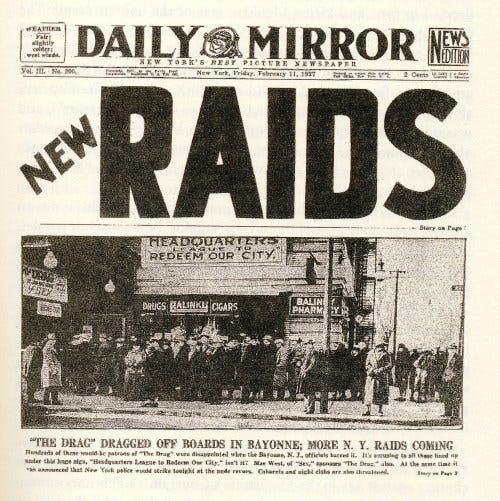What do you think of when you think of James Joyce? D.H. Lawrence? Sinclair Lewis? Do you think of brown paper packages tied up with strings (not the kind that were Julie Andrews’ favorite things)?
Maybe it shouldn’t given that even my subscription to The Advocate comes discreetly wrapped so no one can know I subscribe to an LGBTQ magazine, but it seems strange that many conservative states are banning fabulous works by American Modernists. Believe it or not, lately some states are even banning the Bible due to it’s sometimes racy content. Racy? The Bible? Yep. Take a look at Chapter 19 of “Genesis.” In fact, even classics like Chaucer’s The Canterbury Tales, Defoe’s Moll Flanders, Stowe’s Uncle Tom’s Cabin and Voltaire’s Candide were considered salacious and thus banned at one time or place or another until 1959.
Now our nation—known the world over for “Freedom of the Press”—faces an onslaught of narrow-minded pushback from a group led by a adjudicated sexual assaulter, porn star “knowing,” “grab’em by the pussy” boasting pseudo-Christian. Can you spell hypocrisy? Well, I can, and my love of literature, particularly Modernists, abhors this hypocritical attempt to stifle creative expression.
When a playwright like Eugene O’Neill can face a theatre closure because his play features a black man kissing a white woman we’re in serious trouble. When The Emperor Jones, starring Mary Blair and Paul Robeson, faced smut charges in the 1910s it was understandable. After all, we remained in living memory of the Civil War. But to restore that backward ban more than one hundred years later is absurd.
George Bernard Shaw’s Mrs. Warren’s Profession, Lillian Hellman’s The Children’s Hour, and Aristophanes’ Lysistrata faced bans as well in the 1910s-1920s. Will they again? If certain parties have their way, yes.

If you think all this uproar about drag shows is new, consider Mae West’s The Drag from 1927, a play about men in drag and the bigotry they face. For this play and two others West was brought up on vice charges and sentenced to jail and a fine. I can just hear West saying, “A few days in the pen ‘n' a $500 fine ain’t too bad a deal” as she exited the jail 10 days later. It may or may not surprise you to know that West then donated a sizable chunk of The Drag’s $30,000 opening night income to the women’s prison and later established the Mae West Memorial Library there. Maybe you should “come up and see it sometime.”
Those who are familiar with Lady Chatterley’s Lover by D.H. Lawrence (1885-1930), Elmer Gantry by Sinclair Lewis (1885-1951), The Grapes of Wrath by John Steinbeck (1902-1968) probably can’t understand why something so tame would be banned. Steinbeck’s big sin was illustrating how Oakies were treated in California. Lewis dared question the sincerity of big religion. Lawrence dared suggest women weren’t always satisfied with their arranged marriages. Book banners say it was because of the out-of-wedlock pregnancy, prostitution, and anti-capitalist sentiments therein. That is just a smoke screen. What they really hate is women having agency over their bodies and the denial oligarchic supremacy.
The cycle of hypocrisy fostered by book banning perpetuates the human dilemma and preserves the myth that we can’t all be prosperous.
20th Century Modernism gave voice to the voiceless by depicting the real lives of people faced with a system determined to silence them. This is particularly true of minority voices (LGBTQ, racial and political). Steinbeck was courageous enough to point out that things weren’t always sunny in California for the migrant workers who picked the fields. Lewis had seen first hand how mega-churches can fleece their flocks. Mae West dared to point out that sex was a natural part of human life—and that gay people weren’t always happy. Lillian Hellmann demonstrated how a rumor can destroy a business and a life. These Modernists and others like them hoped to expose how hypocrisy poisons the human family. The man is “sowing wild oats.” The woman is a slut. The worker is greedy when he needs a raise, but don’t you dare ask a CEO to take a cut in pay. Jesus loved “all the little children” but hates the migrant ones who aren’t Christian. The cycle of hypocrisy fostered by book banning perpetuates the human dilemma and preserves the myth that we can’t all be prosperous. Those who want to ban books hope to strengthen that myth at the expense of peace and prosperity for all.
When we become aware of the universal need for peace, prosperity and love, empathy and change are possible.
By reading banned books we can learn about our mutual humanity, our mutual striving for a better world for ourselves and our families. It can show us that migrant farm workers have big dreams no matter where they come from. It can illustrate that women who lack control over their own lives are miserable. It can show us that drag isn’t a drag but a celebration. I’ve learned a lot from the books some folks hope my nieces and nephews will never read. I will buck the system to make sure they do because I believe when we become aware of the universal need for peace, prosperity and love empathy and change are possible.





